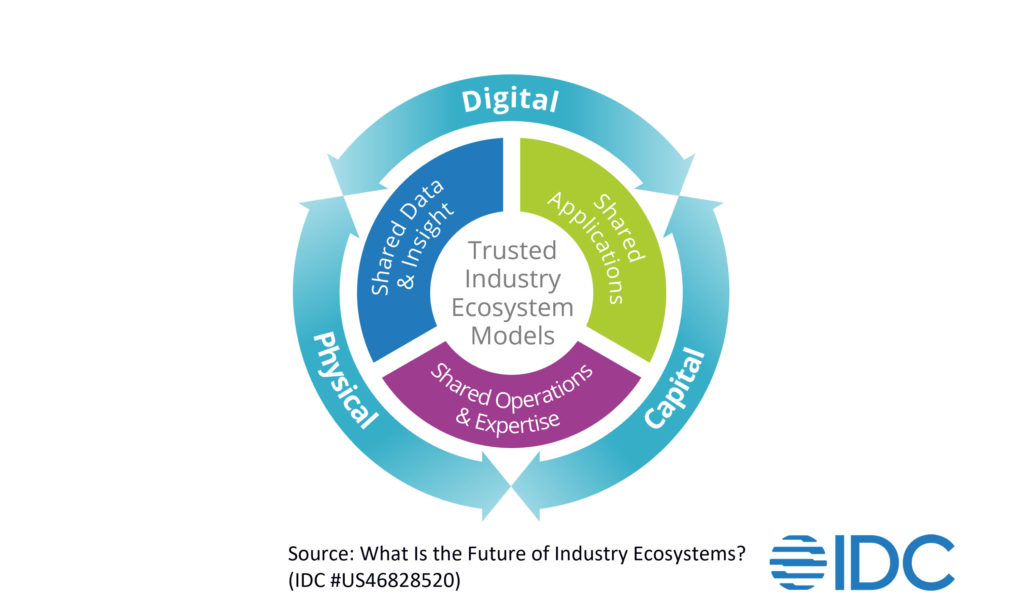Over the course of the COVID-19 pandemic, we have seen a “digital divide” emerge, where companies that invested in digital before 2020 were able to progress through the stages of disruption (business continuity, cost containment, etc.) to the next phase of growth. Digital transformation was accelerated by the need for remote work and collaboration with internal and external constituents, and those companies that had previously implemented DX initiatives prior to the pandemic were, and continue to be, able to respond more flexibly.
Another component of digital transformation that evolved rapidly during the pandemic is the evolution of industry ecosystems from a static list of partners to a diverse, flexible, and scalable mix of technology vendors, industry organizations, industry consortia, supply chains, service providers, service and expert networks, and end customers.
Organizations from every industry, including manufacturing, healthcare, retail, financial services, government, and construction, continue to expand and evolve the way that they work with industry ecosystem partners. Traditional value chains are now open, iterative closed loops between a varied set of partners from inside and outside these organizations — and within and outside their industry.
As our 2021 Global Future of Industry Ecosystems Survey shows, working more closely with industry ecosystem partners is necessary to spark innovation; augment skills, capacity, and knowledge; and enable resiliency. Examples exist today of companies – friend and foe – working in tandem to share data and insights, share applications, and share operations and expertise, and deliver products, services, and experiences in a blended physical and digital way to end patients, citizens, customers, or consumers.

There are multiple use cases supporting each of these initiatives that we think will only grow and expand. Industry ecosystems will play a critical role in the months and years ahead, for companies that realize they need to have a supporting cast of ecosystem participants that function as a scalable extension of organizations, as well as a source of data and insight, codeveloper of applications, and/or provider of shared operations. CEOs, board of directors, and business line leadership realize that a flexible industry ecosystem is necessary to move quickly to meet the end customer’s changing needs, assure product and service safety and quality, adapt to any disruption, and evolve like a biological ecosystem.
Recent IDC research on the future of industry ecosystems explores this digital divide. We expect that organizations that focus on industry ecosystems will begin to derive a large percentage of their revenue from these new business models. A big part of this transformation will be achieved by taking an open approach with industry ecosystems and utilizing tools such as digital twins, blockchain, and innovation communities to accelerate, monetize, and derive value from data, application, and operation initiatives and opportunities.
Capital and foundational support of assets, operations, and finances will come from funding (ecosystem “venture capital”) within industry ecosystems, as well as from governments. Organizations in every industry will continue to mandate that their industry ecosystem partners follow an aligned environmental social governance approach so that their industry ecosystem mission remains consistent, and they can meet patient, citizen, customer, or consumer expectations.
Manufacturers leverage this approach for innovation and manufacturing capacity; healthcare organizations share data and knowledge to improve patient outcomes; energy companies team up and share applications to ensure quality and high performance; and retailers work with their ecosystem partners to deliver goods and services to consumers in a blended physical and digital way. Often these are not only traditional partners but also competitors and organizations from other industries — in fact, IDC’s Future of Industry Ecosystems Global Survey shows that within 12 months most new partners for organizations will come from outside their core industry.
Suffice it to say, the future of industry ecosystems — an expansion of ecosystem participants that organizations must work with in support of any situation, whether innovation, product or service change, dynamic demand, or unexpected disruption — is rapidly progressing as the new way of working to ensure innovation, flexibility, and resiliency.
Please join me on February 8, when I will host a complimentary webinar, Industry Ecosystems Reorient for Purpose, Profit, and Digital Transformation, that looks at how a greater proportion of an organization’s ability to generate value will be tied to its participation in a new economy and new ecosystems.




